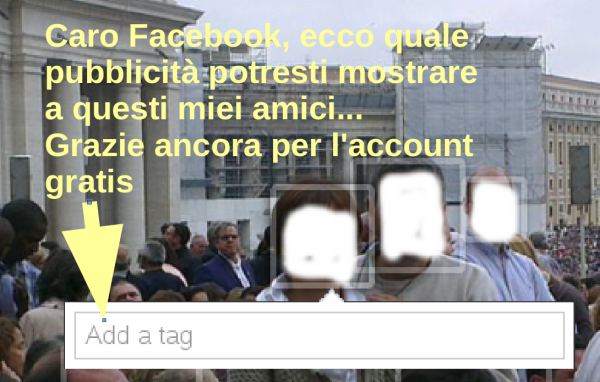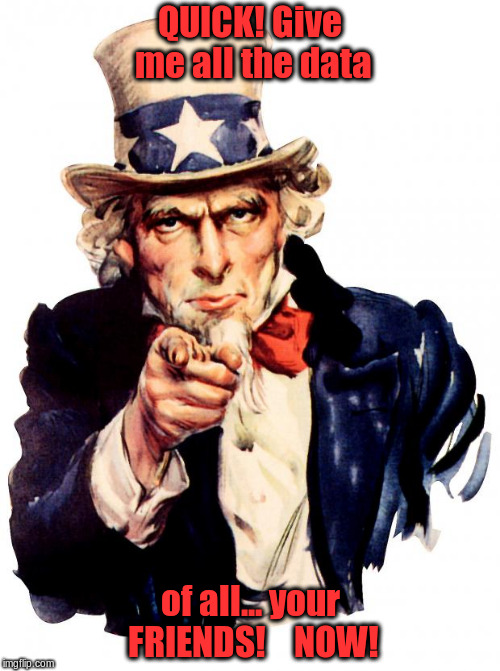The myth of passive social media users, and their war on absence
Passive? Who’s passive?
The internet cliché “You are the product” is wrong, argues the Atlantic: “We are neither products nor workers in surveillance capitalism’s quest for data. We are a passive source of raw material - a field to be harvested, or a mountain to be strip-mined."
When I saw that article I immediately commented on Twitter that saying “passive source” is not ALWAYS correct. As a minimum, we should always ask “passive source of what? About whom?”
Whenever WE tag people in posts or comments…
We are actively harvesting data for Facebook about those people. It is us who are telling Facebook that, for example:
- this friend of mine was at this conference yesterday
- this friend of mine likes Maldives, or this brand of shoes
- etc etc…
We provide that information to Facebook, even if that friend never shared it himself. The same applies to adding people names to pictures seen in Facebook:

Translation: dear Facebook, these are the ads you may want to show to these friends of mine. And thanks again for the "Free" account!
</em></u>
Whenever WE identify people in Facebook pictures…
It is US who actively tell Facebook:
“THIS is what this guy (who maybe never posted a picture of his face himself) looks like, so now you can recognize him in other pictures too, and from there learn who he meets, where, why…"
(while we’re at this: did you ever stop to realize how RUDE it is, and why, to pass phone numbers to WhatsApp or Telegram?)
A data commons that is an absence
Reading those tweets of mine, @csageland replied:
“How can we protect a data commons that is an absence? A right to not be tagged, a collective respect for the solitude and agency of others."
Good question, indeed. I am not sure that is a commons, but here are a few, semi-random thoughts to start thinking about to protect “absence”:
Sometimes, absence is absence of notifications about us, from the social network to others, e.g. the possibility to hide whether we are logged in or not.
Next, never forget that no technology can (thanks heaven) really fix, or improve, human behavior. Only education and human behavior can. In practice: keep your “sharing” of other people to the absolute possible minimum. Never tag others (including your own kids, who did not ask for it). This is a very partial fix, since even your mere sex, or list of contacts is enough to make you pay more for dating, or a mortgage.
Finally, the best way to “protect absence” still seems to me to not put everybody’s data in one and the same basket, where they can be correlated in countless addictive and toxic ways. This is why I’ve been saying for years that “the fix for Facebook is NOT a different PLATFORM”. Absence only exists when and where we were supposed to be together in the same place, after all.
In the meantime, until we’re stuck with “social media that are behavior collection businesses”, always show this to whoever says we are “passive” sources on social networks:

<u><em><strong>CAPTION:</strong>
<a href="/2018/04/who-gives-facebook-data-about-non-facebook-users/" target="_blank">Click to read WHO gives Facebook data about non-Facebook users</a>
</em></u>
Who writes this, why, and how to help
I am Marco Fioretti, tech writer and aspiring polymath doing human-digital research and popularization.
I do it because YOUR civil rights and the quality of YOUR life depend every year more on how software is used AROUND you.
To this end, I have already shared more than a million words on this blog, without any paywall or user tracking, and am sharing the next million through a newsletter, also without any paywall.
The more direct support I get, the more I can continue to inform for free parents, teachers, decision makers, and everybody else who should know more stuff like this. You can support me with paid subscriptions to my newsletter, donations via PayPal (mfioretti@nexaima.net) or LiberaPay, or in any of the other ways listed here.THANKS for your support!